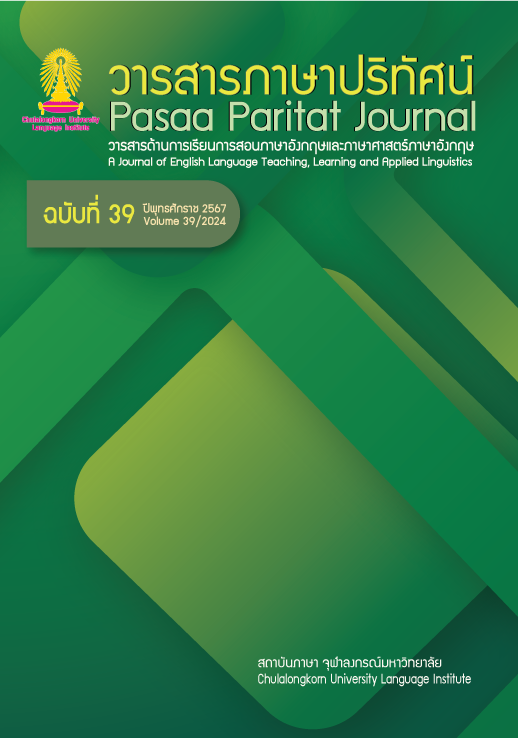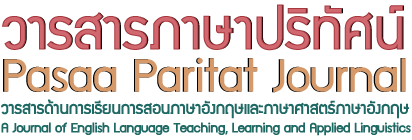โลกของการเรียนภาษาอังกฤษนอกห้องเรียนที่มีชีวิตชีวาผ่าน TikTok: มุมมองจากนักศึกษามหาวิทยาลัยไทยที่เรียนภาษาอังกฤษเป็นภาษาต่างประเทศ
คำสำคัญ:
ผู้เรียนภาษาอังกฤษเป็นภาษาต่างประเทศ, การเรียนภาษาอังกฤษนอกห้องเรียน, การเรียนรู้แบบนาโน, การเรียนรู้นอกห้องเรียน, TikTokบทคัดย่อ
ด้วยบทบาทสำคัญของภาษาอังกฤษและผลกระทบจากการแพร่ขยายของเทคโนโลยี งานวิจัยนี้ศึกษามุมมองของนักศึกษามหาวิทยาลัยไทยจำนวน 110 คนที่เรียนภาษาอังกฤษเป็นภาษาต่างประเทศเกี่ยวกับการใช้ TikTok เป็นเครื่องมือในการเรียนภาษาอังกฤษ ผลการวิจัยพบว่านักศึกษาเป็นส่วนใหญ่มีทัศนคติเชิงบวกต่อ TikTok โดยมีการย้ำถึงประสิทธิภาพของ TikTok ในการเพิ่มความมั่นใจและแรงจูงใจในการเรียน อย่างไรก็ตาม นักศึกษายังรับรู้ถึงข้อเสียบางประการของ TikTok เช่น ช่วงเวลาสนใจที่สั้น และความท้าทายในการทำความเข้าใจเนื้อหาที่กระชับ มุมมองทั่วไปของนักศึกษา คือ นักศึกษามองว่า TikTok เอนเอียงไปทางความบันเทิงมากกว่าการศึกษา งานวิจัยนี้สนับสนุนการใช้ TikTok อย่างมีกลยุทธ์เป็นเครื่องมือช่วยเสริมในการเรียน โดยเฉพาะในการพัฒนาทักษะการฟัง การพูด และคำศัพท์ผ่านเนื้อหาการศึกษาเชิงสนุกสนาน ในทางด้านการสอน ครูผู้สอนภาษาอังกฤษเป็นภาษาต่างประเทศควรพิจารณาการบูรณาการ TikTok เข้ากับกลยุทธ์การเรียนรู้นอกห้องเรียน โดยกระตุ้นให้นักศึกษาติดตามบัญชีหรือช่องที่เกี่ยวข้องกับการสอนภาษาอังกฤษ นอกจากนี้ยังเน้นว่าครูผู้สอนควรนำเสนอข้อเสียของ TikTok อย่างรอบคอบเพื่อให้นักศึกษาใช้อย่างมีสติและมีประสิทธิภาพในการพัฒนาทักษะภาษาอังกฤษ
เอกสารอ้างอิง
Aburizaizah, S. J., & Albaiz, T. A. (2021, September). Review of the use and impact of nano-learning in education. In 4th International Conference on Research in education. https://www.dpublication.com/wp-content/uploads/2021/09/56-4146.pdf
Afidah, N., Sari, N. K., & Hanifah, H. (2021). Investigating students’ perspectives on the use of TikTok as an instructional media in distance learning during pandemic era. DINAMIKA: Jurnal Kajian Pendidikan Dan Keislaman, 6(2), 47–68. https://doi.org/10.32764/dinamika.v6i2.1872
Al-Shehhi, M. A. M. (2022). The use of technology in education: A study about the impact of using nano-learning in teaching English as a foreign language in higher education institutions in the United Arab Emirates (Doctoral dissertation). The British University in Dubai (BUiD).
Bailey, D. R., & Lee, A. R. (2020). Learning from experience in the midst of COVID-19: Benefits, challenges, and strategies in online teaching. Computer-Assisted Language Learning Electronic Journal, 21(2), 176–196.
Blanco-Martínez, A., & González-Sanmamed, M. (2021). Learning from the perspective of ecologies: An experience in Secondary Education through theatre and TikTok. Educatio Siglo XXI, 39(2), 169–190. https://doi.org/10.6018/educatio.465551
Boholm, M. (2016). The use and meaning of nano in American English: Towards a systematic description. Ampersand, 3, 163–173. https://doi.org/10.1016/j.amper.2016.10.001
Bulut, D. (2023). The association between attention impairments and the internet and social media usage among adolescents and young adults with potential consequences: A review of literature. Psychology, 14(8), 1310–1321. https://doi.org/10.4236/psych.2023.148073
Cagas, R. L. D. (2022). The use of TikTok videos in enhancing the speaking and grammar skills of higher education students. Language Education Forum, 3(1), 1–3. https://doi.org/10.12691/lef-3-1-1
Cahyono, A. O. M., & Perdhani, W. C. (2023). Using TikTok in EFL class: Students’ perceptions. Journal of English Education and Teaching, 7(1), 59–77. https://doi.org/10.33369/jeet.7.1.59-77
Dhaninee, S. (2021). Factors that influence people to use TikTok in Thailand [Doctoral dissertation, Mahidol University] CMMU Digital Archive. https://archive.cm.mahidol.ac.th/handle/123456789/4175
Digital Marketing Blog. (2021, February 25). TikTok marketing plan for year 2021 in Thailand. https://www.marketingguru.io/blog/tiktoks-marketing-plan-for-year-2021-in-thailand
Escamilla-Fajardo, P., Alguacil, M., & López-Carril, S. (2021). Incorporating TikTok in higher education: Pedagogical perspectives from a corporal expression sport sciences course. Journal of Hospitality, Leisure, Sport & Tourism Education, 28, 100302. https://doi.org/10.1016/j.jhlste.2021.100302
Fata, I. A., Nur, L. M., & Alya, A. R. (2023). Examining students’ perceptions of Indonesian high school students on the use of TikTok in learning English. Vision: Journal for Language and Foreign Language Learning, 12(1), 17–32. https://doi.org/10.21580/vjv12i216973
Ferraro, V. (2023). Designing with and for emerging materials: Framework, tools, and context of a unique design method. In V. Ferraro, P. Kääriäinen, P. Morer-Camo, & A. Pasold (eds), Materialising the future: A learning path to understand, develop and apply emerging materials and technologies (pp. 3–26). Springer International Publishing.
Hu, H., & Du, K. (2022). TikTok in mobile-assisted English language learning: An exploratory study. International Journal of Information and Education Technology, 12(12), 1311–1320. https://doi.org/10.18178/ijiet.2022.12.12.1755
Huang, S. C., Silalahi, A. D. K., & Eunike, I. J. (2024). Exploration of moderated, mediated, and configurational outcomes of Tourism‐related Content (TRC) on TikTok in predicting enjoyment and behavioral intentions. Human Behavior and Emerging Technologies, 2024(1), 1-29. https://doi.org/10.1155/2024/2764759
Kaye, D. B. V., Zeng, J., & Wikstrom, P. (2022). TikTok: Creativity and culture in short video. John Wiley & Sons.
Kaye, L. K., Egan, I. M., Rowe, B., & Taylor, J. (2024). A qualitative study exploring behaviors which underpin different types of social media use. Psychology of Popular Media. Advance online publication. https://doi.org/10.1037/ppm0000533
Khlaif, Z. N., & Salha, S. (2021). Using TikTok in education: A form of micro-learning or nano-learning? Interdisciplinary Journal of Virtual Learning in Medical Sciences, 12(3), 213–218. https://doi.org/10.30476/IJVLMS.2021.90211.1087
Komariyah, T., Sulistiowati, W., Fajri, L. A., & Allatif, N. (2022, June). The implementation of TikTok application to learn speaking skill in English language teaching (ELT). In Conference on English Language Teaching (pp. 142–154). https://doi.org/10.24090/celti.v2.43
Lamimi, I. J., Alaoui, S. M., & Ouelfatmi, M. (2024). Bite-sized learning on TikTok: Exploring the platform’s educational value within the framework of TAM (Technology Acceptance Theory). Open Journal of Social Sciences, 12(4), 228–245. https://doi.org/10.4236/jss.2024.124015
Mahittivanicha, N. (2020, May 30). TikTok has launched two educational campaigns: ‘#LearnOnTikTok’ for worldwide and ‘#TikTokUni’ for Thailand. https://www.twfdigital.com/blog/2020/05/tiktokuni-learnontiktok-education-content/
Mahu, D. P. (2012). Why is learning English so beneficial nowadays?. International Journal of Communication Research, 2(4), 374–376.
Meirbekov, A., Nyshanova, S., Meiirbekov, A., Kazykhankyzy, L., Burayeva, Z., & Abzhekenova, B. (2023). Digitisation of English language education: Instagram and TikTok online educational blogs and courses vs. traditional academic education. How to increase student motivation? Education and Information Technologies, 1–28. https://doi.org/10.1007/s10639-023-12396-y
Mekler, A. (2021). The effects of TikTok use on college student learning. Undergraduate Review, 16, 145–153.
Mertens, D. M., & Ginsberg, P. E. (2009). The handbook of social research ethics. Sage.
Mingar-Stangeland, R. (2023). Social media and vocabulary learning. Teachers and students in lower secondary school’s beliefs and experiences (Master’s thesis, Oslo Metropolitan University, Norway).
Nguyen, H., & Diederich, M. (2023). Facilitating knowledge construction in informal learning: A study of TikTok scientific, educational videos. Computers & Education, 205, 104896. https://doi.org/10.1016/j.compedu.2023.104896
Novitasari, N., & Addinna, A. (2022). Students’ perception on the use of TikTok for learning English. Journal of English Language Teaching, 11(4), 566–579. https://doi.org/10.24036/jelt.v11i4.119484
Obasi, H. U. (2024). The effect of TikTok on the academic performance of students in tertiary institutions in Nigeria. ISRG Journal of Arts, Humanities and Social Sciences (ISRGJAHSS), 2(2), 298–304. https://doi.org/10.5281/zenodo.10968073
Ruangprapun, C. (2000). Basic statistics and analysis through Minitab, SPSS, and SAS. Khon Kaen University.
Sundqvist, P. (2009). Extramural English matters: Out-of-school English and its impact on Swedish ninth graders' oral proficiency and vocabulary (Doctoral dissertation, Karlstad University). Digitala Vetenskapliga Arkivet. https://urn.kb.se/resolve?urn=urn:nbn:se:kau:diva-4880
TikTok Marketing Plan for Year 2021 in Thailand. (2021, February 25). MarketingGuru. Retrieved October 8, 2023. https://www.marketingguru.io/blog/tiktoks-marketing-plan-for-year-2021-in-thailand
Watkins, D., & Gioia, D. (2015). Mixed methods research. Oxford University Press.
Xu, L., Yan, X., & Zhang, Z. (2019). Research on the causes of the “TikTok” app becoming popular and the existing problems. Journal of advanced management science, 7(2), 59–63. https://doi.org/10.18178/joams.7.2.59-63
Yang, H. (2020). Secondary-school students’ perspectives of utilizing Tik Tok for English learning in and beyond the EFL classroom. In L. Li (ed), 2020 3rd International Conference on Education Technology and Social Science (ETSS 2020) (pp. 162–183). https://dx.doi.org/10.23977/ETSS2020030
Yeung, A., Ng, E., & Abi-Jaoude, E. (2022). TikTok and attention-deficit/hyperactivity disorder: a cross-sectional study of social media content quality. The Canadian Journal of Psychiatry, 67(12), 899–906. https://doi.org/10.1177/0706743722108285
Zhai, X. W., Razali, A. B. (2021). An overview of the utilization of TikTok to improve oral English communication competence among EFL undergraduate students. Universal Journal of Educational Research, 9(7), 1439–1451. https://dx.doi.org/10.13189/ujer.2021.090710
Zhang, Y., Lucas, M., Bem-Haja, P., & Pedro, L. (2023). Analysis of short videos on TikTok for learning Portuguese as a foreign language. Comunicar: Media Education Research Journal, 31(77), 9–19. https://doi.org/10.3916/C77-2023-01
ดาวน์โหลด
เผยแพร่แล้ว
รูปแบบการอ้างอิง
ฉบับ
ประเภทบทความ
สัญญาอนุญาต
ลิขสิทธิ์ (c) 2024 วารสารภาษาปริทัศน์

อนุญาตภายใต้เงื่อนไข Creative Commons Attribution-NonCommercial-NoDerivatives 4.0 International License.



